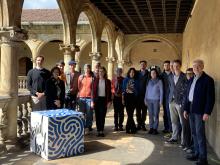Coordinators: Gavin Slade (Nazarbayev University), Matthew Light (University of Toronto), Anne-Marie Singh (Toronto Metropolitan University), Kaja Gadowska (Jagiellonian University), Laura Piacentini (University of Strathclyde), Diego Tuesta (University of Toronto)
Description of the meeting
Russia’s neocolonial war against Ukraine continues unabated. Russia is deploying its criminal justice system as part of the war. It recruits soldiers from among its vast prison population. We now know that if Russia been successful in its initial goal of bringing about regime change in Kyiv, the Russian security services had planned the deportation of undesirable Ukrainians into the Russian hinterland, echoing the historical expulsions of whole peoples to Gulag camps in Siberia in the twentieth century. Socio-legal studies and criminology are ill-equipped to theorise such developments because southernizing movements in criminology and socio-legal studies that ostensibly focus on the impact of colonialism have overlooked the East-Central Europe & Eurasia (ECEE) region, defined for this purpose as the countries that comprised the former Soviet Union and its satellite states in central and eastern Europe. The result is a dearth of socio-legal and criminological expertise and a lack of robust conceptual and empirical work on the region, at a time when it is most needed.
To correct this omission, we are applying to host a workshop with the following goals:
- To understand and thereby correct the erasure of ECEE from southernizing and decolonizing movements in criminology and socio-legal studies.
To achieve this, our workshop will collect papers from experts firstly from the ECEE, but also scholars drawn from the Global North and South who work on the ECEE region and/or work within southernizing movements in criminology and socio-legal studies. - To support the redistribution of knowledge production in favour of the ECEE area.To achieve this, the workshop will prioritise supporting young scholars from ‘Southern’ regions of the ECEE with a particular focus on Ukraine, the Caucasus and Central Asia, the regions with the strongest recent experience of colonialism.
- To develop a conceptual language for thinking about coloniality and knowledge production in socio-legal studies in ECEE.
To achieve this, the workshop has an overarching question in mind: how might we imagine a Global East or an Eastern Criminology and Socio-Legal Studies and with what benefit for these broader fields?
During the two days of the workshop at the Institute, we aim to have approximately 20 presenters across six thematic panels and two keynote addresses by senior scholars. The panels will align with the three objectives above. We aim to foster cooperation on research about and within the ECEE region. The workshop would thus represent a unique opportunity to establish new ties and renegotiate the ECEE’s position within the academy as a whole.
By the end of 2024 the proposers aim to produce a special issue in the Oñati Socio-Legal Series and to apply for funding opportunities to further develop a network of scholars from the ECEE region as well as research that produces empirical insights and theoretical developments from the region.
Our experience in Oñati
We were extremely happy with our experience with the Workshop Coordination Team of the International Institute for the Sociology of Law. It was a pleasure to work with your team. The assistance you provided with communications, logistics, and IT support dramatically reduced the amount of work that we as workshop organizers needed to do and allowed us to focus on our substantive discussions. We particularly noted how responsive Malen and Ainhoa were when our participants needed extra help, for example, with letters for immigration purposes or locating missing keys. It was also appreciated that they suggested places to visit during our free time. We were also very happy with the quality of the accommodations in the residence, which received a number of compliments from the participants. Everything went very smoothly during the workshop, and as a result, we have very few constructive suggestions. In future workshops, it might be a good idea to build in two hours for lunch, rather than one hour. Making sure there is always a vegetarian option available at the restaurant where participants go for lunch would also be a good idea for future reference.

